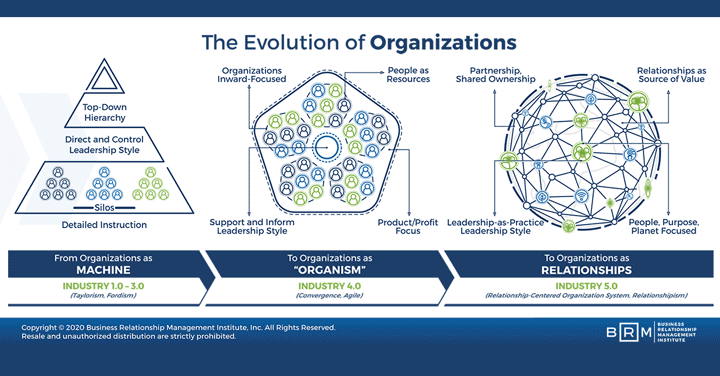The Great BRM Renaissance (and How the Evolved BRMP Plays a Role)

Between the fall of ancient Rome and the beginning of the 14th century, very few advances were made in art and science in Europe. Historically, this period of time is referred to as the Dark Ages. This unfortunate period carries the reputation for being ravaged by the plague, for having backward thinking, for being riddled with wars, and for widespread famine. Simply put, it wasn’t a great time to be alive.
In the 14th century, however, a cultural movement called humanism brought forth the radical idea that humans could impact their own destiny, and a wave of new ideas and achievements in art, science, and literature came about.
If you’ve ever cracked open a history book, you’ll recognize things such as the Last Supper and the Mona Lisa by Leonardo da Vinci; the advancement of telescope use, which allowed Galileo to find the moons of Jupiter and the rings of Saturn; Romeo and Juliet by William Shakespeare; David by Michelangelo; and the findings of Copernicius—that little discovery of the sun, rather than earth, being the center of our solar system. All of these things came about during the Renaissance, the surge of creativity and advancement in Europe.
Just as humanism triggered the great Renaissance in the 14th century, so too is the theory of relationshipism triggering a great BRM Renaissance now.


Back at the turn of the 20th century, production-centered theories emerged to meet the demands of a world driven by industrial booms. These theories (Fordism and Taylorism) spurred human ambition and innovation but compounded issues such as pollution, inequality, and employee dissatisfaction.
The theory of relationshipism was born to a post-Fordism world wanting to recover from those issues while still preserving the advancements that production-centered theories made, a world that is now focused on sustainability and enriching the human experience.
The notion that all organizations should be relationship-based in order to operate at optimal productivity might once have been radical, but bear in mind, the theory that the world was round was once radical too! When Galileo uncovered monumental discoveries in our galaxy, he was actually put on house arrest for questioning science. When William Tyndale translated the Bible into English, he was burned at the stake for heresy, yet because of his efforts, 2.38 billion English-speaking people practicing Christianity can now read the bible. When William Shakespeare penned his plays, women weren’t allowed on stage, so the female parts were played by men. A month ago, the author of this article watched A Midsummer’s Night Dream in Atlanta performed by an all-female troupe. Sometimes, progress isn’t met with open arms. But that doesn’t stop it from coming. It just takes a bit more time to evolve!
When someone believes passionately in their cause, the risks are worth the reward.
Here at BRM Institute, we believe that the theory of relationshipism has the potential to change the landscape of organizations around the world. Relationshipism, being built on principles of cognitive science and social intelligence, provides infinite value as it expands the focus of society from shareholder value to the satisfaction of personal purpose, organizational purpose, and societal impact.
Simply put, we still want organizations to make money—after all, this is what keeps organization running. We just want everyone involved to be happy and fulfilled while they focus on that bottom line. In fact, we want everyone to focus on a new and improved bottom line, a triple bottom line consisting of people, purpose, and planet.
Relationships between people need the context of a meaningful purpose in order to be highly effective work relationships. If an organization’s purpose aligns and helps satisfy an individual’s purpose, that person will bring greater passion into their performance at work, while they nurture relationships, and while they advocate for the organization. The planet, both the earth we inhabit and the cultures and societies we live in, is a primary source of a shared meaningful purpose, and it increases in importance from every generation to the next. With this in mind, it is clear that everything we do is interwoven.
Business relationship management is entering a renaissance.
The BRM capability, role, and philosophy are being rendered a necessity by a world driven to fatigue by early concepts of productionism. We refer to that period of time as Industry 4.0, when productionism was a primary focus. That, however, is giving way to relationshipism, an evolved industrial age 5.0, and the time to focus on it is now.
To kick off this exciting renaissance, BRM Institute has taken input from the global BRM community, and has collaborated to evolve the BRMP® course to support the BRM capability as a fundamental organizational necessity resulting in better relationships, better world. The principles of BRM, applied to any branch of any organization, whether it is finance, people, operations, etc., will improve productivity in a way beneficial to everyone concerned, from the mailroom staff to the executive level.
In fact, it’s been said that if BRM is applied, a project cannot fail. Since we don’t want to invoke the same fate as the “unsinkable” Titanic, we won’t go that far. But we will say that that when BRM is correctly applied and practiced, the triple bottom line will be met, and satisfaction will be at an all-time high.
If you’ve previously taken the BRMP, never fear. We’re rolling out a bridge course for you in early 2022 to bring you up to speed on the evolved, function-generic BRM. If you haven’t taken the BRMP, now is the time. The inaugural evolved class begins on October 18, 2021.
Just like those in the Dark Ages experienced the bubonic plague and then emerged in a renaissance, we too have experienced a widespread pandemic and a surge of evolved productivity.
Welcome to the great BRM Renaissance! It begins here and now in the single, global BRM community. We challenge you to become involved…to become evolved. The world is ready, and it’s waiting for you!
